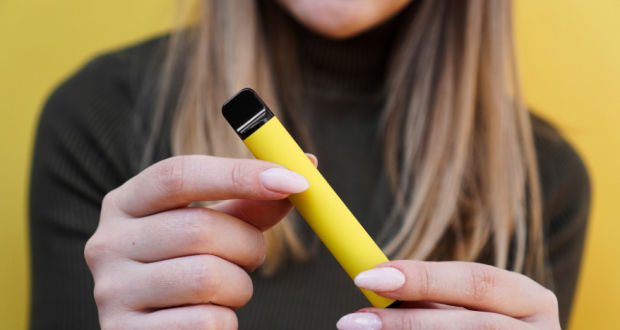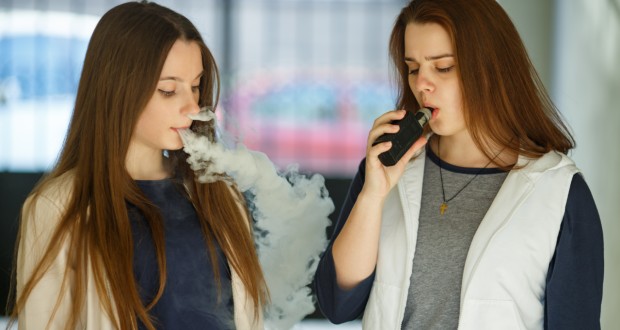People of all ages are being invited to take part in a public consultation seeking views on plans to crack down on youth vaping by reducing the appeal, affordability and availability of vapes to our children.
The consultation launched today (Thursday 12 October) is open to anyone, of any age, in the UK and includes proposals to restrict child-friendly flavours and bright coloured packaging. People have eight weeks to share their experiences and opinions and help shape future policy on vaping and smoking.
Last week, the prime minister unveiled plans to introduce a new law to stop children who turn 14 this year or younger from ever legally being sold cigarettes, in a bid to create the first ‘smokefree generation’. Smoking is the UK’s biggest preventable killer – causing around 1 in 4 cancer deaths and 64,000 in England alone – costing the economy and wider society £17bn each year.

He also set out the government’s concerns about the worrying rise in vaping among children, with youth vaping tripling in the last three years and one in five children having now used a vape. Vaping is rightly used by adults as a tool to quit smoking, but the health advice is clear – if you don’t smoke, don’t vape and children should never vape.
Views on these proposals are now being sought from everyone, including the public, the retail sector, clinicians and medical professionals, public health stakeholders, academic experts, employers and trade unions.
The consultation has generated widespread support right across the four corners of the UK, with the Welsh government, Scottish government, and the Northern Ireland Department of Health all giving it their backing and agreeing to a joint consultation.
Prime minister Rishi Sunak said: “Last week I promised to create the first smokefree generation and I am wasting no time to deliver on that promise.
“Our ambitious plans will reverse the worrying rise in youth vaping while protecting our children from the dangerous long-term effects of smoking as quickly as possible.”
Proposals being consulted on include:
- Making it an offence for anyone born on or after 1 January 2009 to be sold tobacco products
- Restricting the flavours and descriptions of vapes so that vape flavours are no longer targeted at children – we want to ensure this is done in a way that continues to support adult smokers to switch
- Regulating point of sale displays in retail outlets so that vapes are kept out of sight from children and away from products that appeal to them, such as sweets
- Regulating vape packaging and product presentation, ensuring that neither the device nor its packaging is targeted to children
- Considering restricting the sale of disposable vapes, which are clearly linked to the rise in vaping in children. These products are not only attractive to children but also incredibly harmful to the environment
- Exploring further restrictions for non-nicotine vapes and other nicotine consumer products such as nicotine pouches
- Exploring whether increasing the price of vapes will reduce the number of young people using them
- Introducing new powers for local authorities to issue on-the-spot fines (Fixed Penalty Notices) to enforce age of sale legislation of tobacco products and vapes

Health and social care secretary Steve Barclay said: “There has been a surge in vaping amongst children, which is why we’re taking action to reduce the appeal and availability of vapes. Vapes should never be used by children and we’re committed to reversing this trend.
“We also need to take bold action to protect future generations from the harms of smoking addiction, which damages health at every stage of life and costs the economy billions.”
Professor Chris Whitty, chief medical officer for England said: “Smoking causes cancers, heart and lung disease, stroke, stillbirth and dementia. Ensuring people do not become addicted to smoking and helping them overcome addiction to stop smoking are two the best interventions for health.
“Vaping is less dangerous than smoking but still has risks and can cause addiction. Vaping can be useful for smokers to quit but should not be marketed to non-smokers and marketing them to children is utterly unacceptable.

“Selling vapes to children is already illegal, but it is clear from recent statistics that vapes are too often targeted at children with the promotion of cheap, colourful and sweet flavours commonplace. This is despite the addictive nature of nicotine and the long term harms of vapes being unknown.”
Recent figures show the number of children using vapes in the past three years has tripled, with 20.5% of children aged between 11 and 17 having tried vaping in 2023, according to Action on Smoking and Health (ASH). Similar trends are reflected globally, including in Canada and New Zealand. Use amongst younger children is also rising, with 9% of 11- to 15-year-olds reportedly using vapes, according to a 2021 survey by NHS Digital.
Environment minister Rebecca Pow said: “The scale of the waste created by disposable vapes in the UK is shocking – industry research shows nearly 5 million single-use vapes are thrown away every week.
“Not only will the prime minister’s historic proposals to crack down on cheap and accessible disposable vapes help create the first smoke-free generation, but they will be of major benefit to the environment by tackling a particularly problematic waste stream.”
Concerned parents and carers, education professionals and charities have echoed the Prime Minister’s concerns about underage use and availability of often counterfeit or illicit products – frequently displaying cartoons.
 Talking Retail Grocery and product news for independent retailers
Talking Retail Grocery and product news for independent retailers






